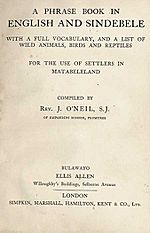Northern Ndebele language facts for kids
Quick facts for kids Northern Ndebele |
|
|---|---|
| Zimbabwe Ndebele siNdebele saseNyakatho |
|
| Region | Matabeleland North, Matabeleland South in Zimbabwe; North-East District in Botswana |
| Native speakers | 1.6 million (2012)e18 |
| Language family |
Niger–Congo
|
| Official status | |
| Official language in | |
| Guthrie code | S.44 |
| Linguasphere | 99-AUT-fk incl. varieties 99-AUT-fka to 99-AUT-fkd |
Northern Ndebele is an African language. People mainly speak it in Zimbabwe. It is also known as Sindebele or Zimbabwean Ndebele. This language belongs to the Bantu language family, specifically the Nguni group. The Ndebele people of Zimbabwe speak this language.
Northern Ndebele is very similar to the Zulu language spoken in South Africa. The Ndebele people in Zimbabwe are descendants of followers of the Zulu leader Mzilikazi. Mzilikazi and his people left the Zulu lands in the early 1800s. This happened during a time of great movement called the Mfecane. They traveled north into what is now Zimbabwe and Botswana. You can find Sindebele speakers in many parts of Southern Africa.
It is important to know that Northern Ndebele and the Southern Ndebele language are not the same language. They are both Bantu languages. However, Northern Ndebele is very much like Zulu. Southern Ndebele is more similar to the Sotho and Tswana languages.
Contents
How to Say Ndebele Words
It is quite easy to pronounce Ndebele words. This is because the vowel sounds usually stay the same. Each vowel has basically one sound. The accent or stress is usually on the second-to-last syllable of a word.
Vowel Sounds
The vowels in Ndebele are a, e, i, o, and u. Here is how they are pronounced:
| Vowel | Pronunciation | Example |
|---|---|---|
| a | like the a in father | [abantwana] Error: {{Lang}}: text has italic markup (help) (children) |
| e | like the e in bed | [emoyeni] Error: {{Lang}}: text has italic markup (help) (in the air) |
| i | like the ee in see | [siza] Error: {{Lang}}: text has italic markup (help) (help) |
| o | like the o in bone | [okhokho] Error: {{Lang}}: text has italic markup (help) (ancestors) |
| u | like the oo in soon | [umuntu] Error: {{Lang}}: text has italic markup (help) (person) |
Click Sounds
Ndebele has three special click sounds. These sounds are written with the letters c, q and x.
The c sound is made by placing the tip of your tongue against your front upper teeth and gums. Then, you press the center of your tongue down. Finally, you quickly move the tip of your tongue backward. The sound is like the "clucking" sound you might make to show annoyance in English. Some words with this sound are [cina] Error: {{Lang}}: text has italic markup (help) (end) and [cela] Error: {{Lang}}: text has italic markup (help) (ask).
The q sound is made by raising the back of your tongue to touch the soft part at the back of your mouth (the palate). At the same time, the sides and tip of your tongue touch your gums. You then press the center of your tongue down and quickly pull the tip away from your gums. The sound is like the "pop" you hear when a cork comes out of a bottle. Words with this sound include [qalisa] Error: {{Lang}}: text has italic markup (help) (start) and [qeda] Error: {{Lang}}: text has italic markup (help) (finish).
The x sound is made by placing your tongue so the back touches the soft palate. The sides and tip of your tongue touch your gums. Then, you quickly pull one side of your tongue away from the gums. Some words with this sound are [xoxa] Error: {{Lang}}: text has italic markup (help) (discuss) and [ixoxo] Error: {{Lang}}: text has italic markup (help) (frog).
Basic Phrases in Ndebele
Here are some common phrases in Northern Ndebele:
| Phrase | How to say it | English meaning |
|---|---|---|
| Salibonani | hello (meaning: "we have seen each other") | |
| Unjani (linjani)? | How are you (you plural)? | |
| Ngiyaphila (siyaphila) | I am fine (we are fine) | |
| Ngikhona (sikhona) | I am fine (we are fine) (literally: "I am here") | |
| Unjani wena? | How are you? | |
| Yebo, ye | yes, yeah | |
| Hayikhona/ hayi/ hayibo | no, nope, no way | |
| Ngiyabonga (siyabonga) | I thank you (we thank you) | |
| Hamba kahle | go well/ good bye (said by the person staying behind) | |
| Sala kahle | stay well/ good bye (said by the person leaving) |
Related Pages
External Links
- "Northern Ndebele for Beginners"
See also
 In Spanish: Idioma ndebele septentrional para niños
In Spanish: Idioma ndebele septentrional para niños
 | Dorothy Vaughan |
 | Charles Henry Turner |
 | Hildrus Poindexter |
 | Henry Cecil McBay |


